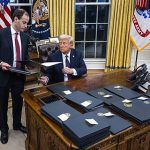
Jeffrey Miron and Jacob Winter
A Senate committee recently advanced a bill that would ban members of Congress from trading individual stocks. Federal law already prohibits federal employees from insider trading.
The case for insider trading bans is weak partly because enforcement is difficult. A recent study illustrates by examining “whether the stock trades of high-ranking IRS officials are associated with tax-related information.” The authors found that “IRS officials’ trades, predominantly their purchases, generated abnormal returns of 0.7–3.5 percent 60 to 120 days after the trade. These findings suggest that IRS officials had relevant information that the market had yet to fully incorporate into stock prices.”
Furthermore, their findings suggest that “IRS officials’ purchases of a stock predict more favorable tax enforcement outcomes against that firm, while sales predict less favorable tax enforcement outcomes.”
As with other prohibitions that are difficult to enforce, bans on insider trading privilege those who can avoid getting caught. For other reasons why these bans are bad policy, see a prior piece by Jeffrey Miron.




